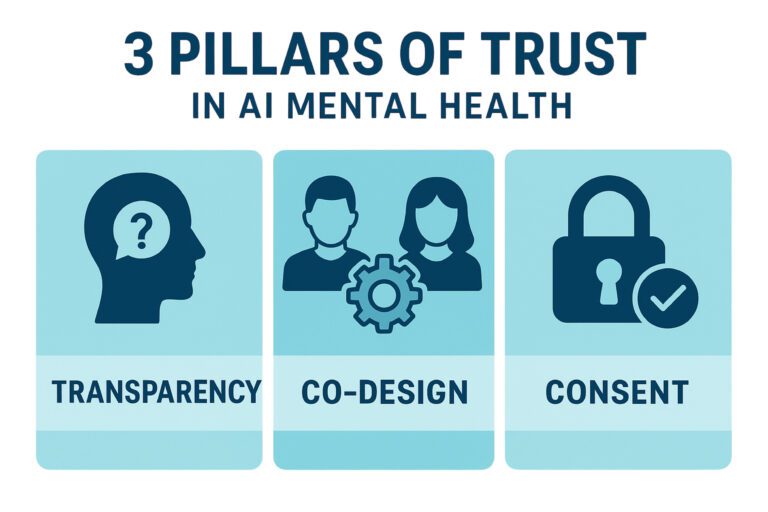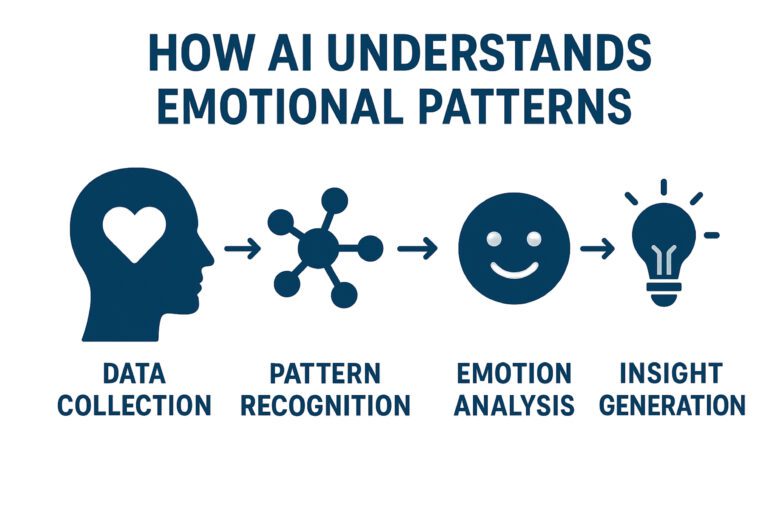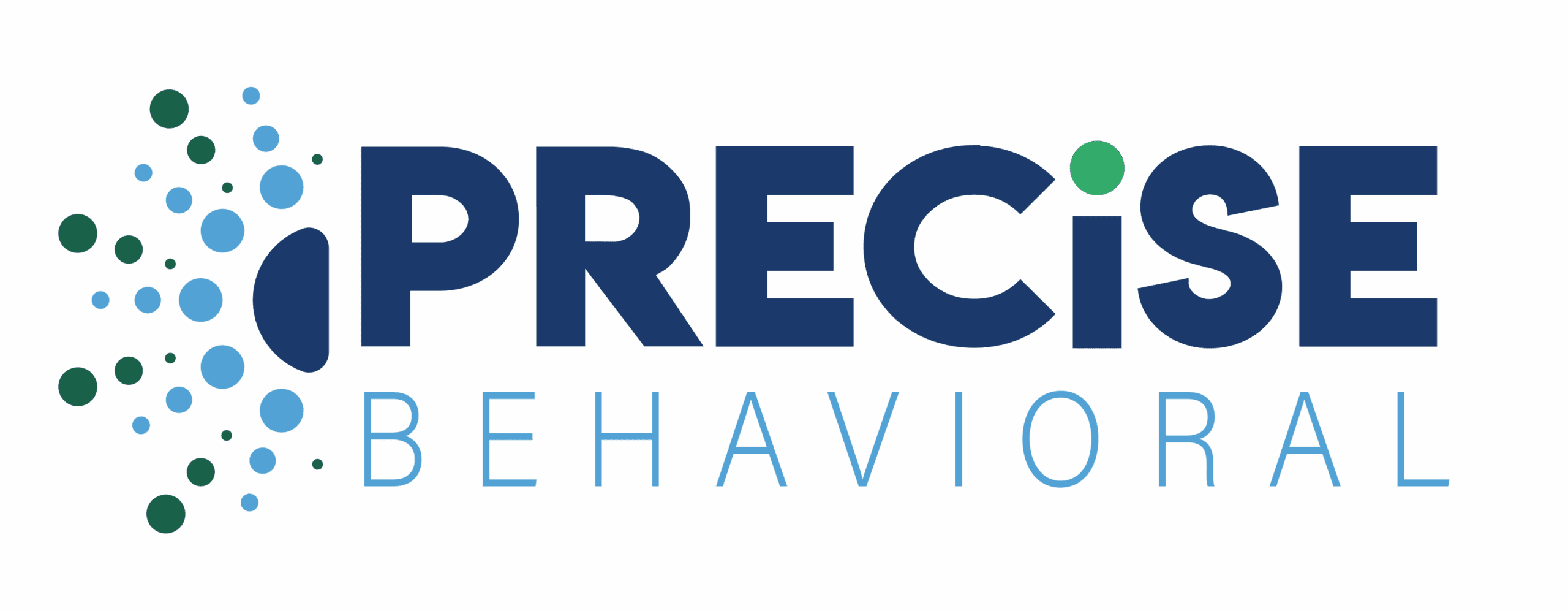Building Trust in Digital Mental Health Tools
Why Trust Matters in Mental Health Tech
In 2025, nearly 970 million people worldwide live with mental health disorders. Yet, two-thirds of them receive no treatment at all (Yangyan Fan, et al., 2025). This stark gap makes AI-powered mental health tools both a promising opportunity and a significant risk.
At Precise Behavioral, we believe technology should never replace human care; it should strengthen it. When it comes to mental health, trust is everything. That’s why we design our solutions around three core principles: transparency, co-designed care, and consent.
Through our AI-powered platform, Precise Digital, we’re reimagining what support can look like, making it more proactive, personal, and accessible. By combining clinical intelligence with interactive tools such as daily journaling, mood tracking, and validated assessments, we help providers stay meaningfully connected to their patients, even between sessions.
At the heart of every breakthrough is something simple: the power to feel seen, heard, and supported, exactly when it’s needed most.
Transparency: Making AI Understandable
When people hear “AI,” many imagine a mysterious black box. That’s cause for concern, especially when it involves personal mental health data. We take a transparent approach by clearly explaining:
- What data we collect, such as mood check-ins or journal entries
- How AI interprets emotional patterns
- Why certain suggestions or alerts are made
Transparency creates psychological safety. It helps people feel informed rather than monitored.
Co-Designed Experiences: Built With, Not For, Humans
Digital health tools work best when they’re shaped by real people. That’s why we involve:
- Patients, who bring their lived experiences
- Clinicians, who understand emotional nuance
- Behavioral scientists, who ensure our tools are grounded in evidence
This collaborative process leads to better design and deeper empathy. In fact, AI used in peer-support settings has been shown to boost empathy by up to 39% when balanced with human insight, as it can suggest more emotionally attuned ways to respond while still allowing the authenticity and judgment of the human voice to guide the interaction (Gillian Ragsdale , 2024). By listening first, we build tools that feel like support, not surveillance.
Consent and Control: Users Stay in Charge
Your data is yours. Period. We design our tools to give users:
- Full control over what’s collected
- Clear options to opt in or out
- Confidence their data is private and secure
This isn’t just about privacy. It’s about emotional agency. People should never feel that AI is analyzing their minds without permission. Consent must be ongoing, not just a checkbox.
What Happens When Trust Breaks?
When trust is missing, technology can harm instead of help. Some chatbot-based therapy platforms have failed to respond to distress signals, like suicidal thoughts, in over 20% of cases (Teddy Rosenbluth, 2025).
Emerging reports caution that using AI chatbots as standalone emotional support can backfire, particularly for vulnerable users. Experts warn that these systems, designed to affirm and engage, can unintentionally reinforce delusions, especially among those with underlying mental health concerns. This has, in some cases, resulted in psychiatric hospitalizations or tragic outcomes (Josh Taylor, 2025).
Accordingly, we ensure that every AI feature we develop is layered with human oversight, ethical vetting, and embedded fail-safes to avoid unintended psychological harm.
Precise Behavioral’s Commitment to Ethical AI

Here’s how we build trust into every tool:
- Transparent explanations of how AI functions
- Co-designed with people who use and deliver care
- Clear, ongoing user consent
- Built-in clinician support, not standalone bots
Final Thought
Technology may be smart, but healing is human.
At Precise Behavioral, our mission is to combine the best of both, pairing innovative digital mental health solutions with compassionate care. Whether through virtual mental health services, telepsychiatry services, or online psychiatric clinical services, we’re not just delivering treatment; we’re building relationships. When someone invites us into their inner world, we have a duty to handle it with care.

References:
Yangyan Fan, et al. (2025, May 15). BMC Psychiatry. Retrieved from BMC Psychiatry: https://bmcpsychiatry.biomedcentral.com/articles/10.1186/s12888-025-06932-y
Gillian Ragsdale . (2024, June 21). Psychology Today . Retrieved from Psychology Today : https://www.psychologytoday.com/us/blog/empathy/202406/ai-can-make-healthcare-more-empathic#:~:text=The%20responses%20written%20in%20collaboration%20with%20AI,did%20not%20completely%20rely%20on%20the%20feedback.
Teddy Rosenbluth. (2025, April 15). The New York Times Company. Retrieved from The New York Times Company: https://www.nytimes.com/2025/04/15/health/ai-therapist-mental-health.html
Josh Taylor. (2025, August 2). Guardian News & Media Limited. Retrieved from Guardian News & Media Limited: https://www.theguardian.com/australia-news/2025/aug/03/ai-chatbot-as-therapy-alternative-mental-health-crises-ntwnfb
Written by Gabriella Aaron
About the Author
Gabriella Aaron is a Clinical Research Analyst at Precise Behavioral, Inc., with a background in Medical Microbiology and a passion for digital mental health solutions.
Editorial Contributors
This piece was edited by Greta Baker and Kirsten Guiliano.



